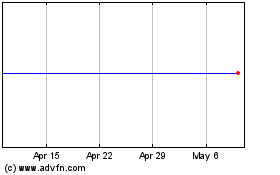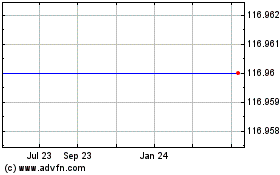U.S.-Saudi Defense Deals Open Up Jobs
May 21 2017 - 1:26PM
Dow Jones News
By Doug Cameron
The arms agreements with Saudi Arabia formally signed by the
U.S. over the weekend could help protect domestic jobs in an
industry that has culled tens of thousands of workers over the past
five years, but also boost employment in the Gulf nation.
Lockheed Martin Corp., Boeing Co. and Raytheon Co. announced a
mix of deals as part of the slew of trade agreements signed by the
U.S. government during President Donald Trump's official visit.
U.S. officials said the defense deals -- which include proposed
sales and final approvals for sales that have been in the works for
many years -- were potentially worth $109 billion. Most have yet to
be completed and hinge on further government-to-government talks,
with the Pentagon then contracting with U.S. defense companies to
supply the equipment.
Alek Jovovic, a principal at consultant Avascent Analytics,
described the headline number as "staggering," and said it raised
questions over the Pentagon's ability to complete so many deals and
Saudi Arabia's ability to absorb so much equipment.
For the defense companies, whose shares have come off the boil
and underperformed the market since the start of the year following
a postelection bump, much hinges on the timing of actual sales.
Lockheed Martin said in a statement that it amassed $28 billion
in potential new business from Saudi Arabia, including the planned
sale of four modified Littoral Combat Ships, reviving a plan
ditched on cost grounds two years ago. It is also selling 150 Black
Hawk helicopters that would be assembled at a new plant in Saudi
Arabia, creating 450 jobs there.
Saudi Arabia also wants to acquire Lockheed's Thaad
missile-defense system, which has already been bought by the United
Arab Emirates, and Raytheon said it was setting up a new
Saudi-based defense arm encompassing munitions and
cybersecurity.
The planned ship and missile-defense sales have already been
approved by Congress and are expected to be the first to make it
into first into companies' order backlogs, said analyst Cai von
Rumohr at Cowen & Co.
Boeing, whose chief executive was in Saudi Arabia alongside his
counterparts at Lockheed Martin and Raytheon, received
congressional approval earlier this year to sell around $7 billion
in Chinook and Apache helicopters to the country. The sale is part
of a deal first tentatively agreed in 2010, which is included in a
$60 billion package negotiated with the Obama administration.
Saudi Arabia is the world's second-largest arms importer by
value after India. Like other Persian Gulf states, it also wants to
build more of its own military equipment to diversify an
energy-dependent economy. Last week, the country announced plans to
establish the state-owned Saudi Arabian Military Industries, which
aims to create over 40,000 jobs by 2030. It is part of the Saudi
Vision 2030 plan announced three years ago to source half of its
defense requirements from domestic suppliers, compared with just 2%
at present.
The largest existing Saudi arms contract from a U.S. company is
the $10 billion deal signed in 2015 to buy hundreds of military
vehicles from the Canadian arm of General Dynamics Corp.
Write to Doug Cameron at doug.cameron@wsj.com
(END) Dow Jones Newswires
May 21, 2017 13:11 ET (17:11 GMT)
Copyright (c) 2017 Dow Jones & Company, Inc.
Raytheon (NYSE:RTN)
Historical Stock Chart
From Mar 2024 to Apr 2024

Raytheon (NYSE:RTN)
Historical Stock Chart
From Apr 2023 to Apr 2024
